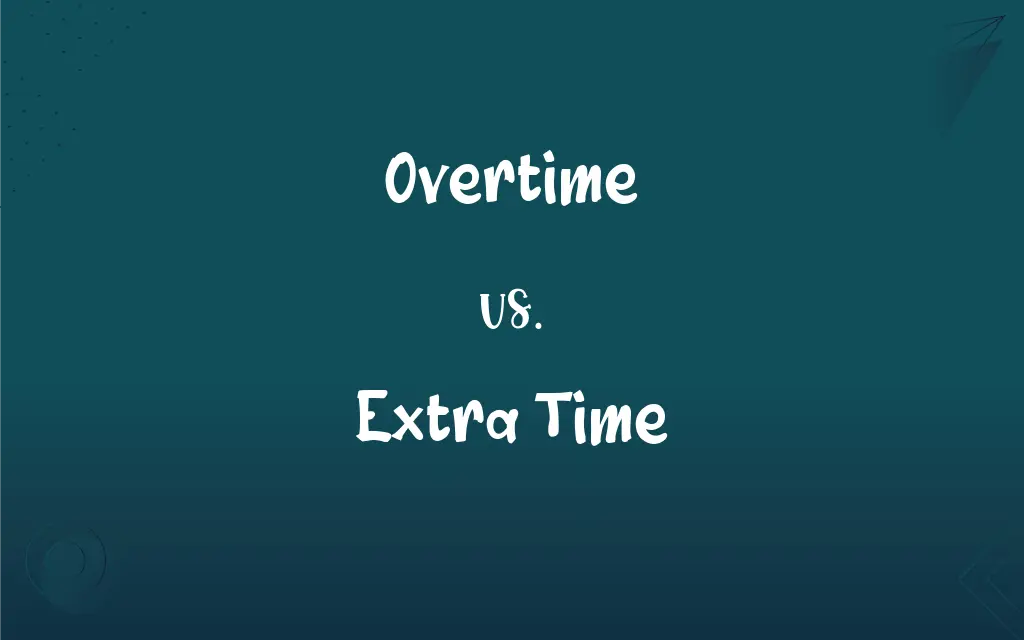Overtime vs. Extra Time: What's the Difference?
Edited by Aimie Carlson || By Janet White || Updated on October 2, 2023
Overtime refers to time worked beyond regular working hours, often with increased pay. Extra Time, on the other hand, typically denotes an additional period in a game or event to break a tie.

Key Differences
Overtime primarily relates to the labor force and the concept of working beyond one's standard hours for additional compensation. Extra Time, however, is usually used in the context of sports or events to describe an extended period designed to break a tie or complete unfinished activities. The main contrast lies in the domains where these terms are used: Overtime is occupational, whereas Extra Time is generally recreational or event-oriented.
Grammatically, both "overtime" and "extra time" function as compound nouns in American English. Overtime can be both an uncountable and a countable noun depending on the context ("I worked two overtimes this week"). Extra Time is primarily used as an uncountable noun but can be countable in some contexts, like multiple periods in a game ("There were two extra times").
In usage, Overtime implies that an employee will often be compensated at a higher rate than their standard pay, as it involves working beyond regular hours. Extra Time, conversely, doesn't usually involve additional compensation; instead, it provides an opportunity to finalize the result of a game, event, or activity.
While Overtime is typically planned or agreed upon in advance between the employee and the employer, Extra Time can be spontaneous, especially in sports, where it's triggered by a tie that needs to be broken. Therefore, Overtime usually involves a mutual agreement for additional work, whereas Extra Time can often be an unexpected yet necessary addition to a pre-set period.
Comparison Chart
Context
Occupational
Recreational or Event-oriented
ADVERTISEMENT
Grammatical Role
Compound noun; both countable/uncountable
Compound noun; primarily uncountable
Compensation
Often involves extra pay
Usually no extra pay involved
Planning
Generally planned in advance
Often spontaneous
Purpose
To complete additional work
To break a tie or finish an activity
Overtime and Extra Time Definitions
Overtime
Work beyond regular hours.
I had to do overtime to meet the project deadline.
ADVERTISEMENT
Extra Time
Additional game period to break a tie.
The soccer match went into extra time.
Overtime
Increased rate of pay for extra work.
She earns time-and-a-half for overtime.
Extra Time
Extended duration for an event.
They added extra time for questions.
Overtime
Time exceeding standard work duration.
He clocked three hours of overtime last week.
Extra Time
Prolonged interval beyond the norm.
We waited in extra time for the delayed flight.
Overtime
Extended duration to complete tasks.
We'll need overtime to finish the inventory.
Extra Time
Bonus period in a schedule.
Extra time is given for complicated projects.
Overtime
Supplemental work period.
Overtime is optional this weekend.
Extra Time
Supplemental moments for activities.
I need extra time to finish the exam.
Overtime
Working hours in addition to those of a regular schedule.
Overtime
(Sports) A period of playing time added after the expiration of the set time limit.
Overtime
Payment for additional work done outside of regular working hours.
Overtime
Beyond the established time limit, especially that of the normal working day
The newspaper staff worked overtime.
Overtime
To exceed the desired timing for
Overtime a photographic exposure.
Overtime
(uncountable) Working time outside of one's regular hours.
Workers are usually paid extra for working overtime.
Overtime
(uncountable) The rate of pay, usually higher, for work done outside of or in addition to regular hours.
Overtime
An extra period of play when a contest has a tie score at the end of regulation.
That last-second shot ties the game 99-99 and sends it to overtime!
Overtime
A period of time longer than scheduled.
Overtime
Exceeding regular working hours.
Overtime
Beyond the normal or usual extent.
Overtime
(transitive) To measure something incorrectly, as taking more time than it actually did.
Overtime
Time beyond, or in excess of, a limit; esp., extra working time.
Overtime
An extra period of time provided to play a game, beyond the end of the normal period allowed for the game, for the purpose of resolving a tie score; as, the team won in overtime.
Overtime
Work done in addition to regular working hours
Overtime
Playing time beyond regulation, to break a tie
Overtime
Beyond the regular time;
She often has to work overtime
FAQs
Is Overtime a compound noun?
Yes, "overtime" is a compound noun in American English.
What is Overtime?
Overtime refers to time worked beyond regular working hours.
What is Extra Time?
Extra Time is an additional period in a game or event to break a tie.
Is Extra Time a compound noun?
Yes, "extra time" is a compound noun in American English.
Is Overtime planned?
Often it is planned and agreed upon in advance.
Is Extra Time mandatory?
In sports, it's often mandatory to resolve a tie; in other contexts, it may vary.
Is Extra Time planned?
Extra Time can often be spontaneous and is triggered by specific conditions like a tie in sports.
Is Overtime mandatory?
It depends on the employment agreement and the specific situation.
How do Overtime and Extra Time differ?
Overtime is occupational and often involves extra pay, while Extra Time is recreational and usually doesn't involve extra pay.
Can Extra Time be multiple periods?
Yes, especially in sports, you can have multiple periods of extra time.
Does Overtime always include extra pay?
Typically, but it can vary based on labor laws and agreements.
Is Extra Time paid?
Usually, Extra Time does not involve additional compensation.
What does Overtime focus on?
Overtime focuses on completing additional work beyond regular hours.
What does Extra Time focus on?
Extra Time focuses on breaking a tie or completing an activity or event.
Can Overtime be multiple periods?
Yes, you can have multiple periods of overtime.
About Author
Written by
Janet WhiteJanet White has been an esteemed writer and blogger for Difference Wiki. Holding a Master's degree in Science and Medical Journalism from the prestigious Boston University, she has consistently demonstrated her expertise and passion for her field. When she's not immersed in her work, Janet relishes her time exercising, delving into a good book, and cherishing moments with friends and family.
Edited by
Aimie CarlsonAimie Carlson, holding a master's degree in English literature, is a fervent English language enthusiast. She lends her writing talents to Difference Wiki, a prominent website that specializes in comparisons, offering readers insightful analyses that both captivate and inform.






































































